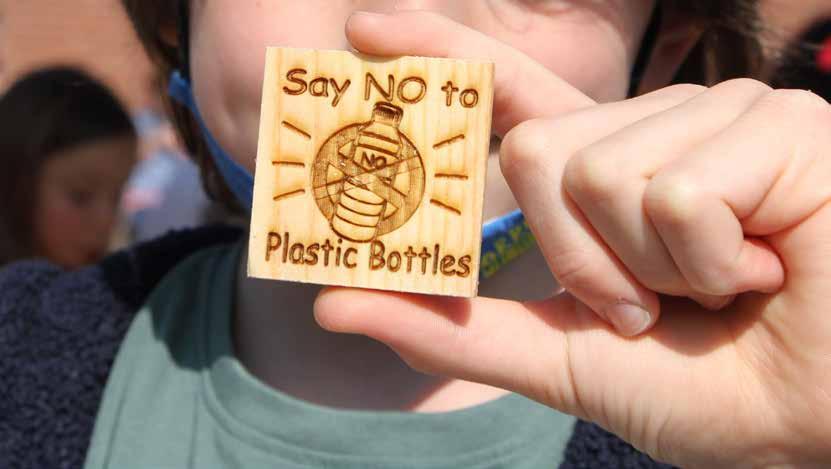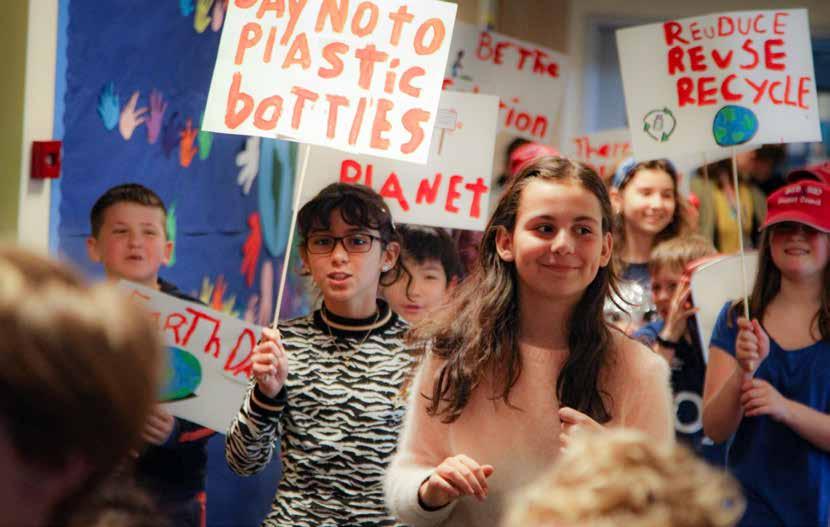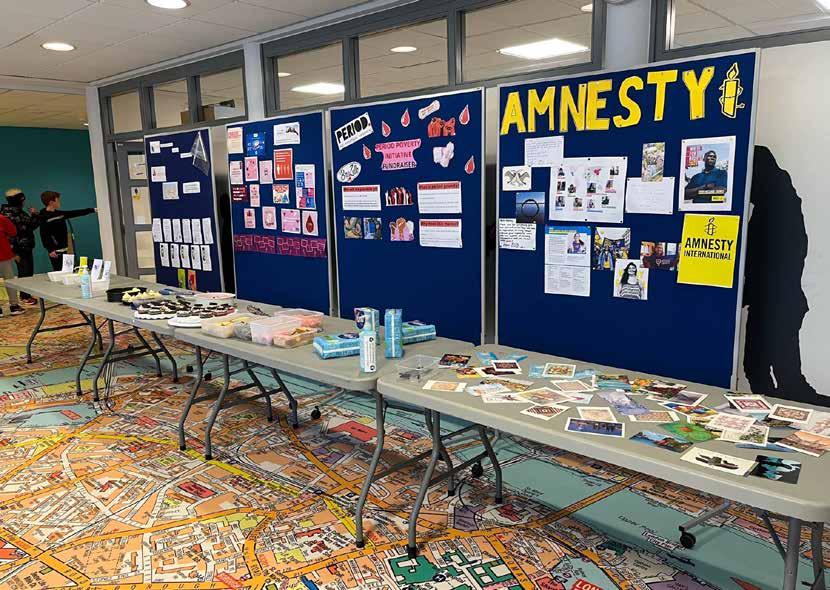
11 minute read
Students in Action
BSB Insider
‘Mental health and the case against exams’
Advertisement
Here, Matej – one of our Press Room writers – talks about the mental health challenges surrounding exams in this opinion piece*.
By now it is common wisdom that our education system is the offspring of the industrial era’s demand for trained and obedient workers. Despite notable improvements in conditions and methods, education continues to serve the same societal role as it did back then. It should come as no surprise that a system with this as a foundational basis is overbearing and stressful for students of all kinds. No offender is worse in this regard than the standard examination.
The statistics are clear. In recent years reported mental health issues as a result of examinations have been rising. Hope Line UK, a confidential support hotline for young people, has seen a quadruple increase in contacts from students and parents since 2013. In the UK in 2018, 23.2% of students reported that anxiety impacted them and 15.4% reported that depression impacted them. This increase is partly attributed to the fact that people are now more willing to speak about mental health issues, however, it also correlates with greater exam pressure on the student population. The most blatant example of this is a pure increase in exam time. Students sitting exams in 2019, on average, faced 9 hours more exam time than those sitting in 2016. Less obviously however, competition between students has also raised the standards to which they are held, something which has been a decades ongoing process. From 1985 to 2013, the percentage of students who scored an “A” increased from some 30% to nearly 50%. This has led to a sort of grade inflation where higher scores become oversaturated, and students are pushed into ever tighter upper grades. A corresponding decrease in coursework hasn’t helped either, as an ever-greater percentage of a student’s grade is determined by exams. All of these factors conspire to make examinations, and preparing for them, a truly demanding experience.
Unsurprisingly, I am not the first person to have noticed the dire state of student mental welfare. Schools across the world have noted an alarming quantity of mental health problems. The standard response has been to try and improve their mental welfare infrastructure, providing counselling and attempting to create a culture of openness about mental health. Tens of millions have been used to fund information campaigns, to provide students with study support and to fuel countless other initiatives.
While the impact of these campaigns can be demonstrated statistically, and they are undoubtedly preferable to inaction, the mental welfare of the student population continues to decline year by year.
Some experts now think that the focus on alleviating the symptoms of stressful examinations is unproductive, and that stress should never have been put on the student population in the first place. Their ideas falter however, because what could possibly be the alternative? Many of us simply can’t imagine a system that doesn’t push us beyond our limits and classify us systematically based on examination scores. Anyone who argues against the system then is nothing more than an idealist. That is why it may surprise you to know that not all corners of the world suffer from this crisis of mental health. In Finland, 15-year-old teenagers reported the highest “life satisfaction” and lowest stress of any European country, followed closely by Switzerland. The Finnish system of schooling produces some of the best results in the world, and it achieves all of it with minimal burden on the students.
Finland uses a system of examination called “low stakes testing”, in that grades are rarely determined by just one exam, if at all. They have flexible school days, significantly less homework and a much more self-directed style of learning. Their school grades are therefore determined over a long period of time, based on their work in class. Even then, they are not as emphasised as they are in Western Europe. A student’s main duty in a Finnish school is indisputably to learn, whereas for us there is a definite conflict between student curiosity and the content of examinations.
Should we imitate the Finnish system then? Well, yes. It’s statistically superior to our own in nearly every way. But just saying “burn the system” and leaving the room, refusing to elaborate, does nothing to combat rapidly declining student mental health. What we can achieve right now is informing ourselves about these problems and their existing solutions and expect that those ideas will pass onto the education boards of the future.
With enough work, we can only hope that our education system will seem as backwards to children of the future as the factory schools of the 1800s seem to us today.
*Opinion is student’s own.
Students in action

Working together for a better, more equal world
Our goal at BSB is to create young adults who rise to the challenge of the modern world. Sadly, some of those challenges put the planet and its inhabitants at risk. This reality, however, has only inspired our students to take responsibility and subsequently take action. Rather than considering it to be someone else’s problem, our students have mobilised in groups across a range of campaigns and causes to rise these challenges and to strive to make a difference.
Part of our school philosophy deals with the concept of nurturing global awareness among our students while developing confident, caring and courageous people. Guided by our dedicated staff, our students are encouraged to engage actively, ethically and purposefully with the world around them.
Over the past two years, BSB students have shown all these qualities in numerous examples of student agency in action, and in most cases going beyond that which was expected of them. Here are some of the highlights from two years of student activism and agency in the areas of sustainability, humanitarianism and social consciousness. One of the main drivers of student change on campus is the Global Issues Network (GIN) group, BSB’s chapter of the international organisation which empowers young people to create positive change in the world.
Among several campaigns our GIN group has been running, the main one over the last two years has concentrated on raising of awareness of sanitary poverty.
Sanitary – or period – poverty refers to the lack of access to sanitary products, menstrual hygiene education, toilets, hand washing facilities, and/or waste management.
Recognising that period poverty is also a widespread issue in Belgium, two Year 12 students, Ava and Justina, decided to collect period products within the BSB community and donate them to homeless shelters in Brussels. Over 3,000 products have been collected to date.
“Period poverty is a pervasive issue, yet people rarely discuss it,” said Justina. “The reasons behind this lack of action stem from the stigma and shame of periods and the female reproductive system in general. This ignorance about menstruation has many damaging effects but, arguably most importantly, it prevents governmental action from being taken to resolve this urgent issue.”

Justina, along with the BSB Global Initiatives Network (GIN) group, went even further and began campaigning for free period products to be provided in the school toilets. This has since been approved and the plan is to use vending machines to distribute the products to students free of charge. Until the products are available in the vending machines, they are provided in baskets in Secondary School.
In addition, ‘PadAid’, one of BSB’s GIN groups, reached the semi-final of the Global Social Leaders competition in May 2022 and will have their work showcased at the GSL Festival in June. With 500 teams entering form 106 countries around the world, this is a massive achievement for the students involved in PadAid.
This follows on from a similar achievement in May 2020 when the original Sanitary Poverty group demonstrated great resilience during the first period of confinement to write their Global Social Leaders report and create their project video under difficult circumstances. Their efforts were rewarded with a semi-final placing and the courage commendation for tackling a taboo subject.
Another incredible story of student action and agency took place in the summer of 2020 when GIN members Lea and Silvia overcame the obstacles of lockdown to defeat global fast food chain McDonald’s on the school’s very doorstep.
“It all started, when I was contacted by the Families of BSB at the start of the summer holidays in July 2020 about how McDonald’s wanted to secure the free plot of land next to the Carrefour supermarket almost directly opposite the school,” said Charlotte Lemaitre, the GIN coordinator at BSB.
“I was approached about starting a GIN group petition but as it was just at the start of the holidays, I was not that optimistic,” she said. “I reached out to Lea and Silvia out of hope and the girls’ response was amazing. Within 24 hours they had created an online petition and I was astounded by the reaction.”
Within just over two weeks, the girls had gained over 2,300 signatures and Lea was back from France being interviewed and featuring on local TV and radio. Eventually, after submitting the petition to the local authorities, McDonald’s then withdrew its plans and ended its interest in the site.
Lea and Silvia were subsequently awarded a COBIS award for their contributions to the wider school community.
Elsewhere, the ‘Catering for All’ campaign, led by Year 13 student Emily, was launched in January 2022 with the aim of making the school’s cafeteria options more inclusive.
The group involved in the campaign surveyed over 200 students about cafeteria options. The survey revealed 48% of vegetarians never eat in the cafeteria and while 75% of vegans never eat in the cafeteria. 37% of students felt the cafeteria didn’t offer enough veggie options and 56% felt the cafeteria didn’t offer enough vegan options.
The group shared the results with Vice Principal Neil Ringrose and requested a ‘Catering for All’ day’ in the cafeteria.
They then invited vegetarians and vegans to attend a lunchtime meeting. The aim of the meeting was to design a successful menu which ‘Catered for All’. Over 25 students turned up and shared their favourite dishes. The group then met with our wonderful catering teams and proposed a special day. They also shared the suggested dishes. The ‘Catering for All’ day’ finally took place on the 27 January, and it was a great success with more students than usual choosing the main courses.
Another major campaign instigated by students on campus is the on-going push for the reduction of single use plastic.
The campaign began before the pandemic hit and was resurrected in early 2022. Students from all year groups and classes were asked by their teachers to think about which issues, they felt were the most important and challenging. The children created posters based on their ideas, which were then presented to the Student Councillors. After a Student Council meeting in which these posters were considered by the attending Councillors and teachers, a common topic was identified: there was an overwhelming passion throughout the school community for the reduction of plastic use in the school and, specifically, in the cafeteria.
“The Student Council then came up with the idea of a badge which students and teachers who support the ‘say no to plastic’ initiative could wear,” said Primary teacher Laura Sanderson, one of the staff coordinators along with colleague Emma Kedzierski. “We then set about organising a competition to design a badge.”
The students used wood and synthetic glue to make their badges, and a prototype of the winning design from Student Councillor Saanvi was created in February and the first badges were sold at a badge and cake sale on Wednesday 4th May by the Student Councillors. The sale raised over 630 euros for the Student Council’s chosen charity, Friends of the Earth.

Another competition was launched earlier in the year to create a short video, infomercial or advert to try to convince students and staff at the school (and everyone in the outside world, in fact) to not buy plastic. The joint winners of the competition were Helen in class 4L, and a collaboration between 5R students: Maya, Julie, Tabitha and Filippa. The winning videos were shown in the Upper Primary School Assembly in March 2022.
BSB students have also joined forces to tackle a different type of rubbish by devising and leading a campaign to tackle technological waste on campus. “As a school we are very fortunate with our technological assets and our vast access to technology across all age groups at our school,” said Kheya, one of the student leaders of the campaign. “However, this easily leads to the problem of technological waste, which is a problem that we face. This year, we decided to tackle this problem whilst also aiming to help youth across Belgium who face digital poverty, a problem which unexpectedly came to light during the period in which many had to study and work from home.
The student group partnered with Close the Gap, an international social enterprise that aims to bridge the global digital divide, and their partner organisation, Digital for Youth, whose main focus is to reduce the gap in Belgium.










